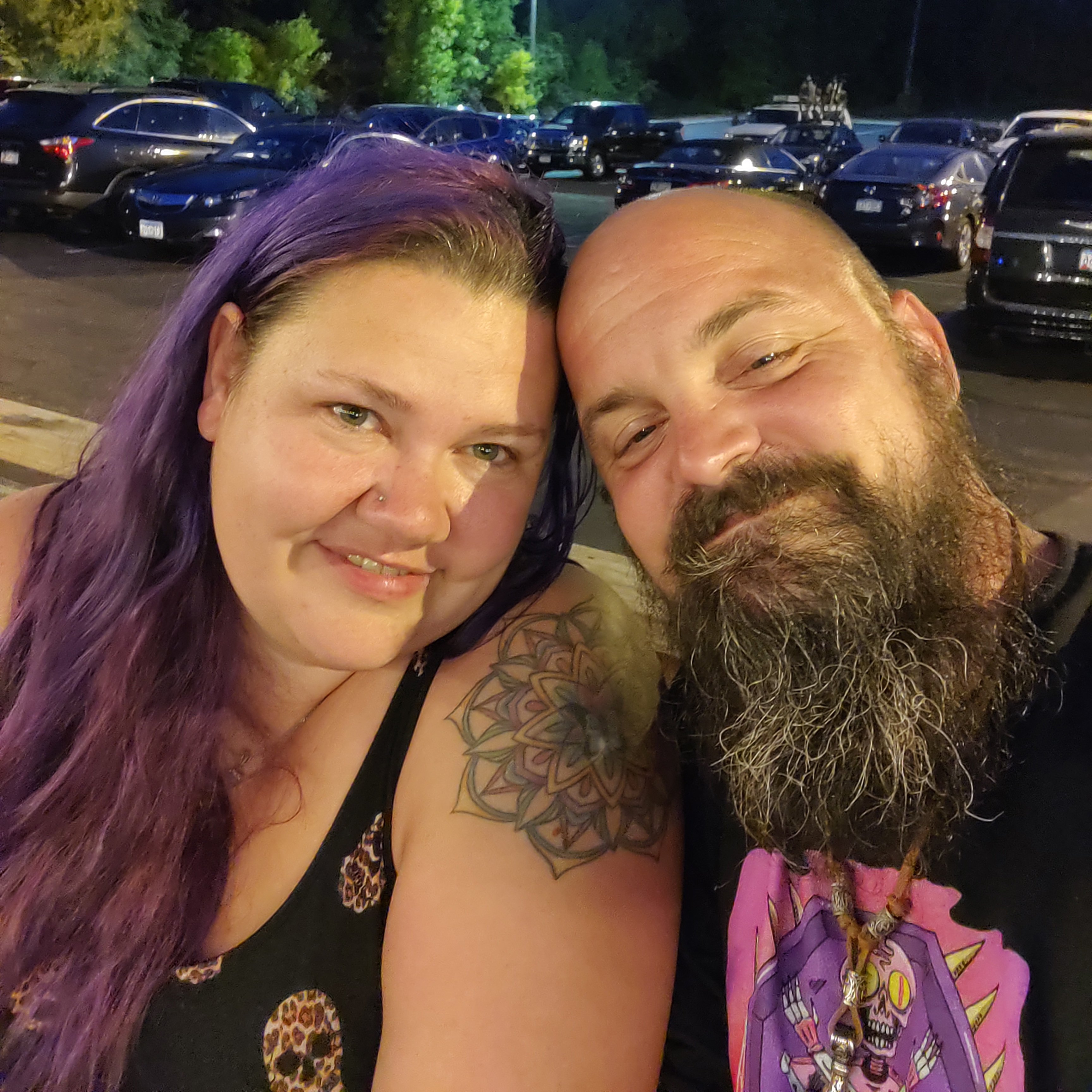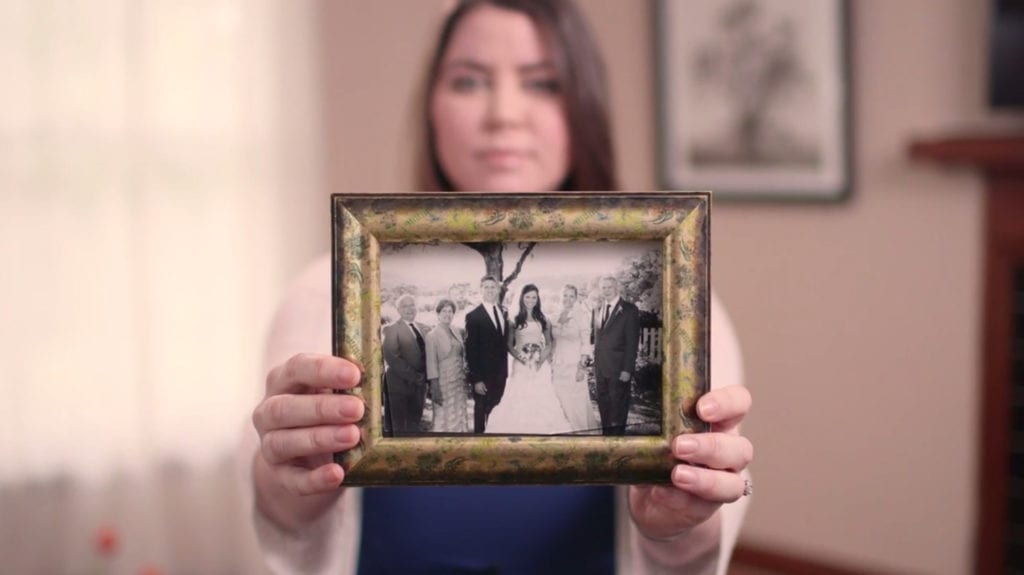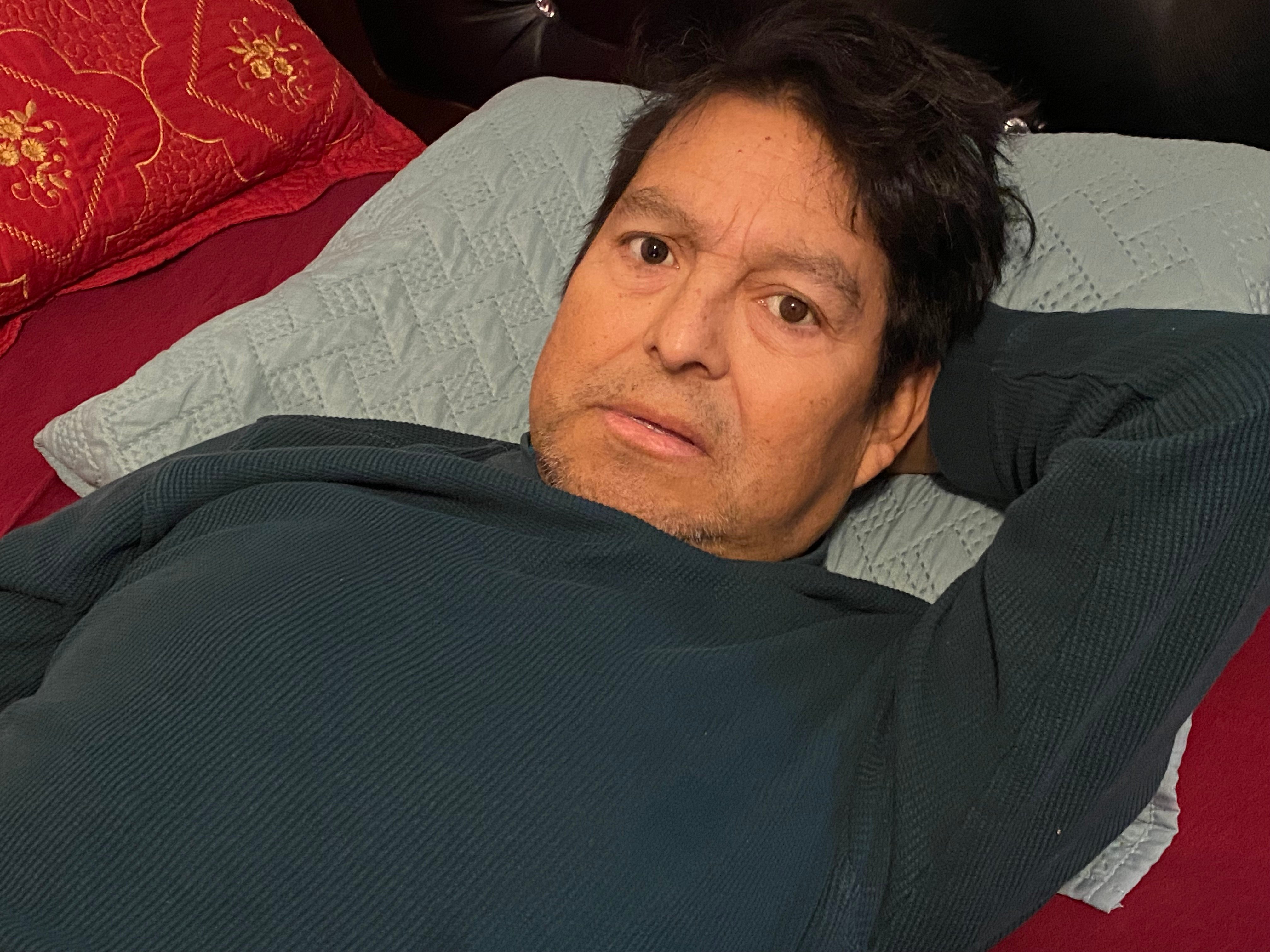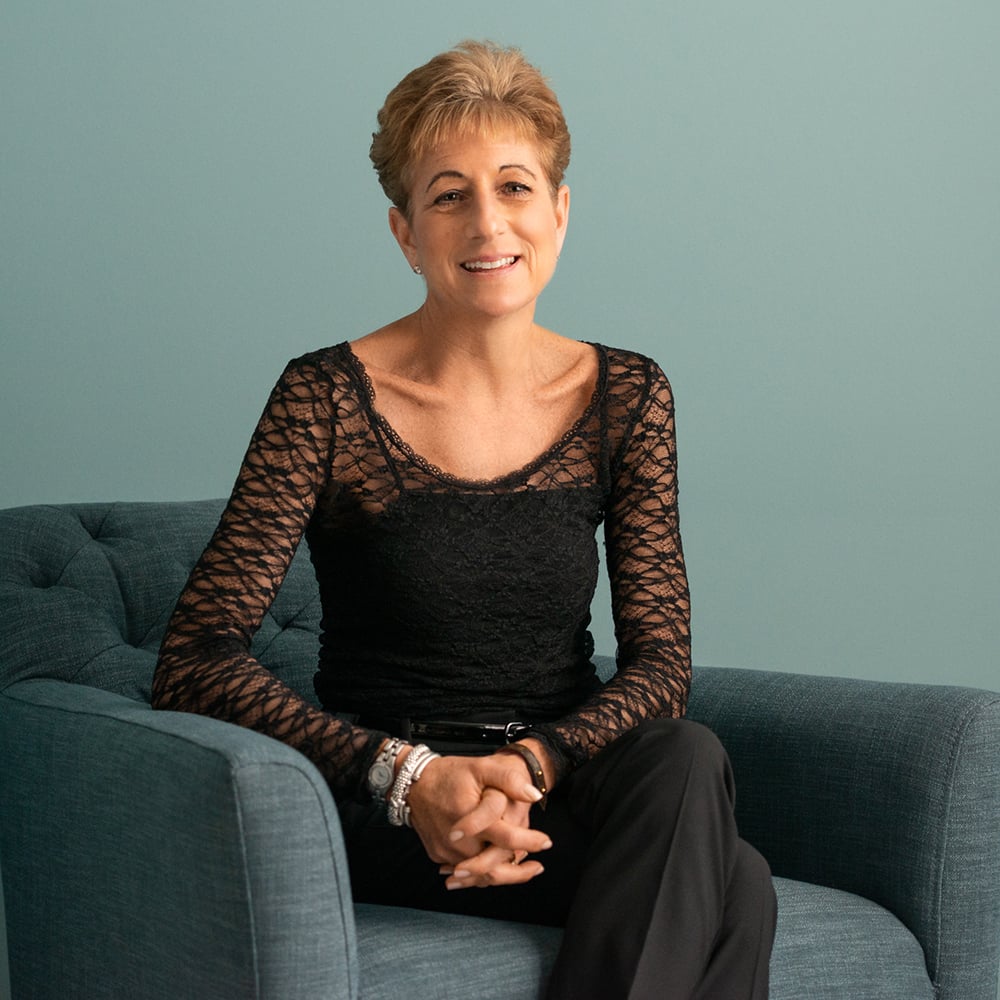If you believe that terminally ill residents in Minnesota should not have to suffer like David, add your name here.
David and Lori shared their story with Compassion & Choices in April of 2023. The following conversation has been edited for length and clarity.
Compassion & Choices (C&C): How and when did you learn you have Parkinson’s?
David Thompson: My dad has Parkinson’s, and his dad had it too. My grandpa’s cousin also had Parkinson’s. Starting in my 20s, I had tremors and something like restless leg syndrome, but it wasn’t until after I got together with Lori in 2019 and she pushed me to see a doctor that I finally agreed to get checked out. Knowing that Parkinson’s is hereditary in my family, I was kind of expecting it.
Lori Thompson: For David, the physical assessment the doctors would normally do is difficult. David was born with a congenital condition where he only has one leg, so there was no way to do the regular evaluation of his gait and shuffling. And there isn’t a reliable test to determine if someone has Parkinson’s. After some inconclusive test results, the doctors said, “The main way we’ll be able to tell if you have the disease is if we put you on Parkinson’s medication and it works.”
David: They prescribed me meds right then and there, and I started taking them. I learned that I do have Parkinson’s from the doctors at the University of Minnesota in April 2021, on my 40th birthday. Finding out that I have it was a shock, but it also wasn’t. I immediately thought about my grandpa. My nana always said that Papa and I were cut from the same cloth. I could literally fit in his clothes — we were the same size, same build. He was a construction worker for many, many years and was the kind of man who would talk to anyone. Just very loving and welcoming. We were very close.
After his Parkinson’s progressed past a certain point, I lived with him and Nana for a year to keep him company when Nana had to go out to run errands. The shuffling walk and slowing speech weren’t too bad for Papa, but the tremors became unbearable. We were eating tacos one day, and he was shaking so bad that everything just fell out of his taco. He couldn’t hold a cup of coffee. Eventually his mobility issues increased, and he fell and hit his head, which is what killed him.
So I’m watching all of this unfold, and I’m thinking, “There’s no way in hell I’m going through that.”
For me, quality of life is very important. I want to live life to the fullest. When I heard that a medical aid-in-dying bill was being discussed in Minnesota, I took a lot of comfort in that possibility because I don’t want to have to leave Minnesota to have some control over the end of my life.
C&C: Can you describe the current and expected symptoms of your illness?
David: How I look at it is I’m traveling the same exact road as Papa. Everything I’ve experienced so far has been the same as what I saw with him — the traumatic tremors, struggling to eat, right down to losing my sense of smell. Speaking — I start mumbling when I’ve overdone it.
Lori: His tremors are not bad right now, because he took his meds this morning. But as the day goes on it gets considerably more noticeable. You’ve also had brain fog and a lot of insomnia. Getting six straight hours of sleep is miraculous.
I think in ways it is both less scary and more scary to know what’s in store for you. Less scary because it’s less of the unknown, but more scary because you know the struggle your papa and now your dad have gone through.
C&C: What sorts of treatments have you undergone, and how have you adapted to symptoms and side effects?
David: I’m on two of the commonly prescribed Parkinson’s medications. Side effects include compulsiveness and mood variations. My doctor also wants me to try something called DBS (Deep Brain Stimulation), which is a surgical therapy that might help control my tremors better and mean that I wouldn’t need so many meds.
Lori: To adapt to the tremors, we’ve bought weighted utensils to help David eat. He needs weighted blankets to get any sleep, otherwise his leg is going all over the place. He also has a new wheelchair, and he’s working out how to maneuver that with a tremor.
C&C: What conversations have you had about your end-of-life choices and values?
David: Lori has been very supportive. She’s always asking, “What would you want in such-and-such situation?”
Lori: I would be uncomfortable having these conversations if it weren’t what I do for work. As a hospice nurse, I have conversations every day about how people want to die. I’ve seen many comfortable deaths, but I have also been present for some very uncomfortable dying processes. It’s so hard not to be able to bring comfort to people in those situations. You watch patients who are actively dying for weeks, and they just want to know when it will be over. They want to be able to say, “Listen, before I die, we’re going to have a big celebration while I’m still here instead of everyone saying those nice things after I’m gone.” It’s so traumatic for patients, for families and for caregivers.
David: The fact that medical aid in dying is not available right now in Minnesota, it makes me very angry. I don’t want to feel like I’m drowning because I can’t swallow. I want to be comfortable in my last days. We can’t control everything in our lives, but it would be such a relief if I could control my own death, my way.
C&C: How would having the option of medical aid in dying in Minnesota benefit you?
David: I’d be happier than hell. With Parkinson’s, stress makes everything 10 times worse. Knowing that I could stay in my home state would be one huge burden lifted from my shoulders. I don’t want to have to spend my last days figuring out the logistics of moving somewhere else where medical aid in dying is authorized. I want to enjoy my last days here, at home.
Lori: David has lived in Minnesota his whole life. He has never lived anywhere else. And if we have to move out of this state so David can die the way he wants to, it’s going to be really disappointing and really hard. Because his family will either have to afford to go where he goes, or they won’t be able to be there for him. And I think that’s a real injustice for someone to leave the only state they’ve ever known because they’re not allowed to have autonomy.
David: Do I stay and suffer because all my family’s here? It’s difficult to even think that I might have to move out of state just to be able to die like I want. I’m stubborn as hell, but am I going to be able to do what I need to do to go on my last journey?
Lori: It’s like an onion: Every time you think of one thing, you think of another. How would we afford a move out of state? That’s a huge expense. We have three children here in Minnesota. And what about our other family — who can afford to uproot their lives? It feels insurmountable. But dying a protracted and painful death also feels insurmountable.
C&C: What would an ideal end-of-life process look like for you?
David: I want to have a big old party. I want people to look back and say, “David’s celebration of life? That was badass. That was so much fun. I’m glad we got to see him one last time and send him out with one last hurrah.”
Lori: Would you want to have that big group of people there when you actually took the medication?
David: No, it would be a big party at first, and then a very few select people for the very last moments. Then it would be the opposite of the party: calm, with my Viking meditation music in the background. I would just let go and know the gods are calling me home. It would also be cool to have someone write down what I was experiencing and feeling. It could be beneficial for people who are curious or unsure about whether or not they want to do it to have that information.
C&C: What brings you joy and quality of life?
David: My family and our three kids. My wife Lori is my rock. And Hela, our dog.
Lori: We love spending time as a family going rock hunting. We like to look for agates on the North Shore of Lake Superior. All three kids really enjoy rock hunting, and for David and me it’s something where we can just get in a zone and not be thinking about other things. It’s very peaceful.
David: Yeah, I love being in nature. It’s a part of my spirituality. My dog, Hela, is named after the Norse goddess of the underworld who takes care of anyone who dies from sickness or old age. In Norse mythology, the underworld is not a place of torment or anything like that. The way I look at it, there are many names for God. How do we know they aren’t all one?
Lori: There’s only one way to find out.
David: I’m training Hela right now to be my service dog. My dad volunteers at an assisted living facility, and when I go with him, I bring Hela. She’s very popular with the residents.
Lori: David also volunteers with my hospice, and every time he brings the pup in, the patient just loses it, she’s so excited. And then everybody’s lined up to see her.
C&C: What would you say to people who don't support medical aid in dying as an option?
David: I’d just ask them why. Everybody has the right to their own opinion. But I’d like to know why and understand where they come from, and help them understand where I'm coming from.
Lori: For me, if you don’t like it, don’t choose it. When you get sick, you get to choose what hospital you go to. Why can’t someone choose something that brings comfort? You can choose to do chemotherapy if you get cancer, so why can’t someone choose to end their life in a gentle and peaceful way when other things don’t work anymore?
C&C: If you had a moment to speak to Minnesota legislators about medical aid in dying, what would you tell them?
David: I’m a down-to-earth, straightforward talker. I’d be pushing them hard.
Lori: I’d say, “If this were your own spouse who had a terminal illness and you knew they were going to have the most epic pain that no medicine could ever help, wouldn’t you want them to have the option to take a medication that has been closely monitored from a program that has never been abused in the entire time it has existed in other states, and give them a comfortable passing on their own terms?” I think it would be really hard to say you’d let them suffer.
One of the first conversations David and I had after we first started getting to know one another was about my work as a hospice nurse. He said, “That’s got to be a tough job.” And I started talking about it, and I told him, “From what I see, the hardest illnesses for people are Alzheimer’s, multiple sclerosis, Parkinson’s and ALS.” I then found out his dad has Parkinson’s and his papa had it. And then we go through this now. It’s such a terrible disease in that it’s usually pretty slow-acting, so you’re constantly grieving, grieving through every single loss, grieving at every step. It would really bring solace if David could choose what he’s going through.






